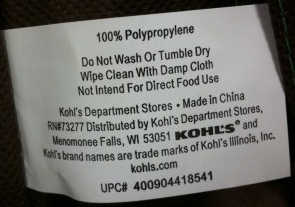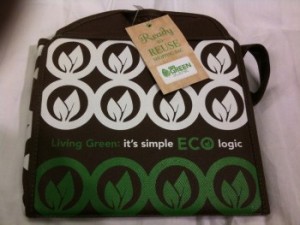 By guest author Dennis Salazar of Inside Sustainable Packaging
By guest author Dennis Salazar of Inside Sustainable Packaging
First let me say I love Kohl’s retail stores. If you are looking for almost any brand name product ranging from clothing and bedding to luggage and small kitchen appliances, Kohls’ makes it difficult to pay “full retail price” with their never ending sales and promotions. They are terrific but when they stretch the green truth, I feel a strong obligation to call them out on it.
The Ready to Reuse Shopping Bag
At first glance it looked like a great idea. A reusable shopping bag that thanks to a unique design and a well placed snap, neatly folds up into a compact little package. I am sure we all mostly agree the use of reusable shopping bags is probably a good idea so anything that will make them easier to carry and use can only be a plus. Add some green graphics, some cool green buzz words and voila, you have a … plastic bag.
“The Devil Is in the Details”
Was one of my grandfather’s favorite sayings and an eternal, indisputable truth. No matter what the subject or when it is being said, the small unobvious details are often where the truth or lack of it can be found.
 A close look at the small tag, I found deep inside of the bag told me so much more than the colorful bag or the outer tag so prominently displayed. The bag is 100% polypropylene, which of course is nothing more than plastic. This particular bag, like most that are used to help “save the earth”, is imported from China. I think most of our readers know how I feel about importing products like this from the other side of the world, especially when over 10% of our own population is unemployed.
A close look at the small tag, I found deep inside of the bag told me so much more than the colorful bag or the outer tag so prominently displayed. The bag is 100% polypropylene, which of course is nothing more than plastic. This particular bag, like most that are used to help “save the earth”, is imported from China. I think most of our readers know how I feel about importing products like this from the other side of the world, especially when over 10% of our own population is unemployed.
Putting that carbon footprint and exporting jobs issues aside, here are some other things that are likely to go unnoticed by the average reusable bag buyer.
- There is no indication of recycled content. That is not good.
- There are no instructions for the ultimate disposal of the bag. It will eventually have to be discarded, but how?
- The tag clearly indicates it is not for use with food but can’t we assume people shop for groceries more often than they do for sox and underwear? Shouldn’t that important information be somewhere where people are more likely to see it?
- Since it is likely to be used for grocery shopping, wouldn’t it be great if it was washable? Google “reusable bag germs” and get ready to be shocked.
Am I Anti Reusable Bag?
Not at all, but as a lifelong packaging person with a deep interest and commitment to preserving the environment, here are a few things I suggest you keep in mind if you decide to buy and use reusable shopping bags.
- Make sure the bag is made of natural fibers. Don’t replace multiple, easily recycled plastic bags with one that can only wind up in a land fill.
- Ideally a bag should have some amount of recycled content.
- Make sure you know where and how you will eventually dispose of it.
- If possible, TRY to find something that is made in America.
The Myth and Truth about Lemmings
The rodents of that name do not follow each other into a suicidal Arctic plunge as is the popular belief. However, well meaning retailers have indeed been known to follow each other all the way to China in search of a low cost product that will appeal to their increasingly eco minded customers.
Let’s face it, this is not all that technical and it is not like buying high tech electronic equipment. All it takes is a few good questions and any retailer can do green and do it right.
Dennis
Thanks Dennis for another great insight on the retail market. Both Salazar Packaging and Nashville Wraps try hard to provide truth, choices and advice regarding green packaging products.
R. Meadows
Nashville Wraps
I have a business that is based on recycling or repurposing what is already here. I make bags in all different shapes and sizes out of fabrics that are from curtains, rugs, bedspreads, whatever I can find that is still sturdy. At my shop I use Nashville wrap bags because they are as close as I can get to being green that I can find out there other than what I make myself.
There is another issue with many of the imported bags… Toxic levels of lead in the inks and fabric dyes. While packaging made in the US by reliable sources (Such as Nashville Wraps) conforms to the specifications of Heavy Metals and Toxins in packaging, many of the import bags do not. It is surprising to see the lead content in bags being distributed by several major “eco” stores. A comprehensive test for heavy metals costs only about $500 and will tell the real story.
As a promotional products distributor, I, too, am disturbed by the fact that many “ecofriendly” products are made overseas. In fact my research shows that only about 10% or less of all promotional products are made in the USA.
Luckily, most of the reusable bags my go-to suppliers offer are marked with recycling codes (i.e. 1 or 5) and I can usually get verification on percentage of recycled content if required. Good news is that there are reusable bags that are 100% recycled material.
My only concern with “natural” fiber bags is that if it is not “organic,” the environment can suffer due to overfarming, pesticides, herbicides, and water use that is huge. So I would suggest looking for organic material when looking for reusable bags.
This is a great post that presents several things to think about when purchasing this type of item. Thanks much!